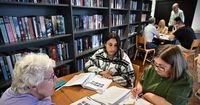Universities in the Netherlands are taking significant steps to enhance the Dutch language proficiency of international students and staff, with institutions like the University of Twente leading the charge. This initiative aims to strengthen the role of Dutch in higher education while also addressing concerns about the increasing number of international students. However, universities are demanding a modification to the government's legislative proposal on internationalization as a condition for implementing these changes.
The universities are advocating for the removal of the Toets anderstalig onderwijs (TAO), a test that currently requires programs to justify their use of languages other than Dutch. According to the universities, this test places an unnecessary administrative burden on them without improving the quality or accessibility of education. Caspar van den Berg, chairman of Universiteiten van Nederland (UNL), described the TAO as "far too rigorous," emphasizing that it complicates the educational landscape rather than enhancing it.
Furthermore, the announcement of the mandatory TAO has already created uncertainty among prospective students and institutions, leading to a loss of international talent that the Netherlands desperately needs. The universities argue that they can respond more swiftly and effectively to the needs of students without the constraints imposed by the TAO.
In a related development, universities in the Randstad region may soon discontinue their English-language bachelor's programs in psychology. This decision is part of a broader strategy proposed by UNL to regain control over the internationalization of education and address the challenges posed by the influx of international students. The government has expressed concerns that the high number of foreign students exacerbates housing shortages and displaces Dutch students.
The rationale behind discontinuing these programs lies in the observation that many international psychology students leave the Netherlands shortly after graduation, contributing little to alleviating domestic labor shortages in the healthcare sector. In addition to psychology, UNL has suggested converting economics and econometrics programs to Dutch and implementing maximum capacities for English-language tracks in certain economics programs.
However, the implementation of these measures is contingent upon the removal of the TAO from the government bill concerning existing bachelor's programs. UNL fears that the TAO would impose additional administrative burdens on 208 programs, further complicating their efforts to adapt to the changing educational landscape.
As the universities navigate these challenges, they anticipate a reduction in the number of incoming foreign bachelor students by over 11 percent compared to the peak year of 2022-2023. This decline is already evident, as uncertainty surrounding the government's proposed measures has made the Dutch educational system less appealing to international students.
In the past year, almost one million foreign workers were employed in the Netherlands, representing one in ten workers. In some villages and vulnerable urban neighborhoods, foreign workers constitute nearly a quarter of the population, according to Monique Kremer, chair of the Advisory Council on Migration. The council recently advocated for a "National Program for Living Together," emphasizing the need for better integration of migrant workers into Dutch society, starting with language classes.
In Tegelen, a village in Limburg, local residents have taken the initiative to provide Dutch language lessons for foreign workers. This project, led by retired school principal Sjraar Dambacher, aims to foster community cohesion and help newcomers integrate into their new environment. Dambacher noted that many residents in Tegelen have neighbors who do not speak Dutch, which can hinder social cohesion.
The need for language education is underscored by the fact that the number of labor migrants in Noord-Limburg has surged from 23,000 in 2017 to 53,000 in 2024, marking a 130 percent increase. This rapid growth has sparked protests and anti-immigrant sentiments in the region, with 36 percent of residents voting for anti-immigration parties.
Martina, a 31-year-old Slovakian who recently moved to Tegelen, embodies the spirit of integration as she learns Dutch. She, along with her classmates, attends weekly language lessons at the local community center. The lessons not only aim to equip them with language skills but also to foster connections within the community. Martina expressed her determination to learn Dutch, stating, "I want to understand my child, who is now in daycare and comes home with words I don’t comprehend, like 'buitenspelen' (playing outside)."
Justyna Barglowske and Marek Szostek, both Polish, are also part of the language program. They share similar motivations for learning Dutch, including the desire to communicate effectively in their new environment. Szostek, who works in a distribution center where English is commonly spoken, recognizes the importance of learning the local language for social integration.
The Advisory Council on Migration emphasizes the importance of government investment in the integration of labor migrants, suggesting that language classes should be provided during work hours to ensure accessibility. Dambacher and his fellow volunteers hope that their efforts will lead to meaningful integration of newcomers into the community. They are motivated by the lessons learned from past waves of migration, understanding that familiarity fosters acceptance.
As the Netherlands grapples with the challenges posed by international students and labor migrants, the push for better language education and integration initiatives reflects a broader desire to create a more cohesive society. The initiatives in Tegelen and the proposed changes by universities illustrate a growing awareness of the need for effective communication and understanding among diverse populations.
In conclusion, the ongoing dialogue about internationalization in education and the integration of labor migrants highlights the complexities of creating an inclusive society in the Netherlands. As universities and communities work together to address these challenges, the emphasis on language proficiency and cultural understanding will be crucial for fostering a harmonious coexistence.



